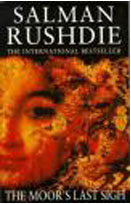|
REVIEW
The Moor's Last Sigh is a novel about modern India. Its hero is Moraes Zogoiby of Bombay, nicknamed by his mother "the Moor." But the famous sigh to which the title refers was breathed five centuries ago, in 1492, when Muhammad XI, last sultan of Andalusia, bade farewell to his kingdom, bringing to an end Arab-Islamic dominance in Iberia. Fourteen ninety-two was the year, too, when the Jews of Spain were offered the choice of baptism or expulsion; and when Columbus, financed by the royal conquerors of the Moor, Ferdinand and Isabella, sailed forth to discover a new route to the East.
From Sultan Muhammad a line of descent, partly historical, partly fabulous, leads to Moraes, the narrator, who in 1992 will return from the East to "discover" Andalusia. In a dynastic prelude occupying the first third of the novel, Moraes's genealogy is traced back as far as his great-grandparents, the da Gamas. Francisco da Gama is a wealthy spice exporter based in Cochin in what is now Kerala State. A progressive and a nationalist, he soon disappears from the action (Rushdie gives short shrift to characters whose usefulness has ended), but his wife Epifania, faithful to "England, God, philistinism, the old ways," survives to trouble succeeding generations and to utter the curse that will blight the life of the unborn Moraes.
Their son Camoens, after flirting with Communism, becomes a Nehru man, dreaming of an independent, unitary India which will be "above religion because secular, above class because socialist, above caste because enlightened." He dies in 1939, though not before he has had a premonition of the violent, conflict-riven India that will in fact emerge.
Camoens's daughter Aurora falls in love with a humble Jewish clerk, Abraham Zogoiby. Neither Jewish nor Christian authorities will solemnize their marriage, so their son Moraes is raised "neither as Catholic nor as Jew,...a jewholic-anonymous." Abandoning the declining Jewish community of Cochin, Abraham transfers the family business to Bombay and settles in a fashionable suburb, where he branches out into more lucrative activities: supplying girls to the city's brothels, smuggling heroin, speculating in property, trafficking in arms and eventually in nuclear weapons.
In Rushdie's hands Abraham is little more than a comic-book villain. Aurora, however, is a more complex character, in many ways the emotional center of the book. A painter of genius but a distracted mother, she suffers intermittent remorse for not loving her children enough, but prefers finally to see them through the lens of her art. Thus Moraes is worked into a series of her paintings of "Mooristan," a place where (in Aurora's free and easy Indian English) "worlds collide, flow in and out of one another, and washofy away.... One universe, one dimension, one country, one dream, bumpo'ing into another, or being under, or on top of. Call it Palimpstine." In these paintings, with increasing desperation, she tries to paint old, tolerant Moorish Spain over India, overlaying, or palimpsesting, the ugly reality of the present with "a romantic myth of the plural, hybrid nation."
Aurora's paintings give a clear hint of what Rushdie is up to in this, his own "Palimpstine" project: not overpainting India in the sense of blotting it out with a fantasy alternative, but laying an alternative, promised-land text or texturation over it like gauze.
Rushdie came under attack for The Satanic Verses and will no doubt come under attack�from other quarters� for The Moor's Last Sigh. In the former case he defended himself ably, arguing that readers who smelled blasphemy were oversimplifying and misreading his book. But his defense was not heard: authority to interpret was almost at once wrested from him by factions with political aims of their own. The Satanic Verses thus provided a model illustration of how, in Gayatri Spivak's words, the "praxis and politics of life" can override a "mere reading" of a book. Let us hope (o tempora! o mores!) that determined foes of The Moor's Last Sigh will confine their energies to the artefact and let its author be.
A final word. Five centuries after the campaigns of Ferdinand and Isabella swept Islam out of Iberia, the Muslims of southeastern Europe faced genocidal attack. Though the word Bosnia is not so much as breathed (or sighed) in his book, it is inconceivable that the parallel did not cross Rushdie's mind as he wrote, or will not cross ours.
|
